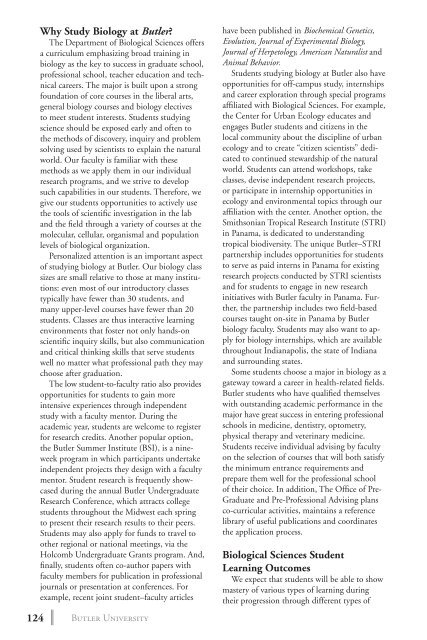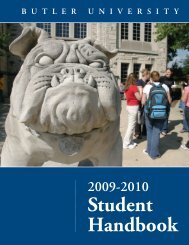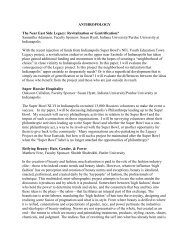2 0 1 3 bulletin - Butler University
2 0 1 3 bulletin - Butler University
2 0 1 3 bulletin - Butler University
Create successful ePaper yourself
Turn your PDF publications into a flip-book with our unique Google optimized e-Paper software.
124<br />
Why Study Biology at <strong>Butler</strong>?<br />
The Department of Biological Sciences offers<br />
a curriculum emphasizing broad training in<br />
biology as the key to success in graduate school,<br />
professional school, teacher education and technical<br />
careers. The major is built upon a strong<br />
foundation of core courses in the liberal arts,<br />
general biology courses and biology electives<br />
to meet student interests. Students studying<br />
science should be exposed early and often to<br />
the methods of discovery, inquiry and problem<br />
solving used by scientists to explain the natural<br />
world. Our faculty is familiar with these<br />
methods as we apply them in our individual<br />
research programs, and we strive to develop<br />
such capabilities in our students. Therefore, we<br />
give our students opportunities to actively use<br />
the tools of scientific investigation in the lab<br />
and the field through a variety of courses at the<br />
molecular, cellular, organismal and population<br />
levels of biological organization.<br />
Personalized attention is an important aspect<br />
of studying biology at <strong>Butler</strong>. Our biology class<br />
sizes are small relative to those at many institutions:<br />
even most of our introductory classes<br />
typically have fewer than 30 students, and<br />
many upper-level courses have fewer than 20<br />
students. Classes are thus interactive learning<br />
environments that foster not only hands-on<br />
scientific inquiry skills, but also communication<br />
and critical thinking skills that serve students<br />
well no matter what professional path they may<br />
choose after graduation.<br />
The low student-to-faculty ratio also provides<br />
opportunities for students to gain more<br />
intensive experiences through independent<br />
study with a faculty mentor. During the<br />
academic year, students are welcome to register<br />
for research credits. Another popular option,<br />
the <strong>Butler</strong> Summer Institute (BSI), is a nineweek<br />
program in which participants undertake<br />
independent projects they design with a faculty<br />
mentor. Student research is frequently showcased<br />
during the annual <strong>Butler</strong> Undergraduate<br />
Research Conference, which attracts college<br />
students throughout the Midwest each spring<br />
to present their research results to their peers.<br />
Students may also apply for funds to travel to<br />
other regional or national meetings, via the<br />
Holcomb Undergraduate Grants program. And,<br />
finally, students often co-author papers with<br />
faculty members for publication in professional<br />
journals or presentation at conferences. For<br />
example, recent joint student–faculty articles<br />
<strong>Butler</strong> <strong>University</strong><br />
have been published in Biochemical Genetics,<br />
Evolution, Journal of Experimental Biology,<br />
Journal of Herpetology, American Naturalist and<br />
Animal Behavior.<br />
Students studying biology at <strong>Butler</strong> also have<br />
opportunities for off-campus study, internships<br />
and career exploration through special programs<br />
affiliated with Biological Sciences. For example,<br />
the Center for Urban Ecology educates and<br />
engages <strong>Butler</strong> students and citizens in the<br />
local community about the discipline of urban<br />
ecology and to create “citizen scientists” dedicated<br />
to continued stewardship of the natural<br />
world. Students can attend workshops, take<br />
classes, devise independent research projects,<br />
or participate in internship opportunities in<br />
ecology and environmental topics through our<br />
affiliation with the center. Another option, the<br />
Smithsonian Tropical Research Institute (STRI)<br />
in Panama, is dedicated to understanding<br />
tropical biodiversity. The unique <strong>Butler</strong>–STRI<br />
partnership includes opportunities for students<br />
to serve as paid interns in Panama for existing<br />
research projects conducted by STRI scientists<br />
and for students to engage in new research<br />
initiatives with <strong>Butler</strong> faculty in Panama. Further,<br />
the partnership includes two field-based<br />
courses taught on-site in Panama by <strong>Butler</strong><br />
biology faculty. Students may also want to apply<br />
for biology internships, which are available<br />
throughout Indianapolis, the state of Indiana<br />
and surrounding states.<br />
Some students choose a major in biology as a<br />
gateway toward a career in health-related fields.<br />
<strong>Butler</strong> students who have qualified themselves<br />
with outstanding academic performance in the<br />
major have great success in entering professional<br />
schools in medicine, dentistry, optometry,<br />
physical therapy and veterinary medicine.<br />
Students receive individual advising by faculty<br />
on the selection of courses that will both satisfy<br />
the minimum entrance requirements and<br />
prepare them well for the professional school<br />
of their choice. In addition, The Office of Pre-<br />
Graduate and Pre-Professional Advising plans<br />
co-curricular activities, maintains a reference<br />
library of useful publications and coordinates<br />
the application process.<br />
Biological Sciences Student<br />
Learning Outcomes<br />
We expect that students will be able to show<br />
mastery of various types of learning during<br />
their progression through different types of
















